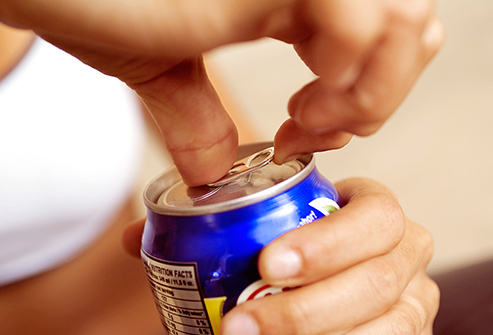As per a recent analysis, those who regularly drink sugary drinks or sweetened beverages have a larger chance of stroke and cardiovascular problems compared to people that avoid carbonated beverages.
Researchers unearthed drinking’diet’ variants of carbonated beverages with artificial sweeteners such as sucralose, aspartame, also stevia will not reduce cardiovascular health threats.
A brand new study finds that those who wish to stay heart-healthy needs to avoid drinking artificially carbonated beverages such as diet pop up.
As shown by a recent analysis by French investigators, those who regularly drink artificially carbonated drinks or regularly carbonated drinks have a larger chance of stroke and cardiovascular problems compared to people that avoid carbonated beverages.
“This analysis shows that high users of carbonated beverages and sweetened beverages both had a greater chance of a primary cardiovascular function,” lasted Mintz. Artificial sweeteners are related to weight gain, insulin resistance, obesity, and diabetes”
The investigation, published this week at the Journal of the American College of Cardiology, viewed statistics in over 100,000 participants at the NutriNet-Santé cohort, a continuing, online study from France that’s participants record their own daily diet, activity level, and health status in 6-month periods.
“carbonated beverages consumption has grown worldwide lately while signs demonstrating that their detrimental effect on cardio-metabolic health is collecting,” explained Eloi Chazelas, PhD student, lead author of this analysis and also a part of the Nutritional Epidemiology Research Team, told Healthline through email.
As an example, Chazelas and team divided volunteers to three classes: non-users, low-consumers, along with high-consumers of diet or carbonated drinks.
The carbonated drinks contained carbonated drinks, fresh fruit juices, and syrups that comprised at least 5 per cent sugars and 100 per cent juice. Diet drinks had been people who comprised artificial sweeteners such as aspartame, sucralose, or an all natural sweetener such as stevia.
Chazelas added that artificially carbonated drinks are promoted as a much healthier alternative, however,”that their cardio-metabolic impact is debated” He put out to look into the connections between”the ingestion of carbonated beverages, artificially carbonated beverages as well as the risk of cardiovascular illness at a large prospective cohort.”
Artificial sweetener usage correlated with Heart Problems
Chazelas and team afterward separately compared sugar/diet-drinking customs to come across any very first instances of stroke, heart attack, sudden paid off bloodflow into the center, or else angioplasty, in accordance with the analysis.
Researchers after eliminated premature instances of cardiovascular disease at first three decades of this analysis to correct for confounders which may hamper the information and also found that a statistically significant association between artificial sweetener usage and cardiovascular illness.
“Greater intakes of carbonated beverages and ASB [artificially carbonated drinks ] were correlated with a high probability of CVD [cardiovascular disease], indicating that ASB may possibly be considered a nutritious replacement carbonated beverages,” the study authors wrote.
“water, water, and much more water are the drink of choice,” he explained. “Given youth obesityno more or unsweetened [unnaturally healthy ] beverage needs to really be described as a staple in their diet plans “
Artificial precisely the same danger as glucose
While discovering an abysmal association between swallowing sugar-laden drinks and cardio vascular disease, researchers also discovered that individuals who drink diet variants of the drinks with artificial sweeteners such as sucralose, aspartame, along with stevia experienced the exact same health threats, in contrast for their participants that did not report drinking any carbonated drinks.
As stated by Chazelas, previous researchTrusted Supply affirms his findings,”Studies imply that [artificial sweeteners] might have adverse metabolic effects like increased adiposity, diminished glucose homeostasis, also hyperinsulinemia, in addition to adjustment of gut microbiota.”
“There isn’t any evidence to indicate an area in center health,” insisted Becker. “In reality, the inverse might be true”
He highlighted that”the mechanics for determinant can be a place of intensive evaluation,” and two chances will explain the analysis .
The following is,”artificial compounds can confound or alter the intestinal microbiome with negative effects”
Industry bands disagree
“Unlike the claims made within this novel [that the Chazelas study], there’s in fact no signs that low/no-calorie sweeteners could boost the probability of cardio vascular illness, nor a logical mechanism where they can lead to cardiovascular problems in humans,” that the International Sweeteners Association (ISA) said in a announcement .
The ISA also promised the Chazelas’ study simply temporarily described”the consequences of an investigation of data from the NutriNet-Santé Cohort.”
The Association remarked this is an observational analysis that will not demonstrate a cause and effect relationship. In addition, the research authors acknowledge that other aspects which may cause these impacts can’t ever be fully eradicated out of this research.
“Low- and – no-calorie sweeteners are deemed safe by regulatory bodies across the globe and there’s a considerable body of research, for example a report by the World Health Organization, which reveals these additives are a helpful tool for helping people cut back glucose ingestion and slim down,” she says.
Smotkin additionally mentioned other studies as revealing the basic safety of artificial sweeteners.
A 20 17 review of most studies heading past decades over the aftereffects of non – and – no-calorie sweeteners,” financed by WHO, also reviewing 372 research studies, discovered that the available research given”no conclusive evidence” these additives put individuals at an increased risk for weight reduction or disorder.
A 20-19 reviewTrusted Source financed by WHO discovered that low- and – no-calorie sweeteners can help fat individuals get rid of weight and there is some signs that these sweeteners help kids avoid obesity. This inspection also uncovered no signs that sweeteners cause you hungrier or eat longer.
The Most Important Thing
New research finds a connection between swallowing artificially carbonated drinks and cardio vascular illness — yet, the research couldn’t prove sweeteners caused disorder, just there is an institution .
Pros say there is no region in a hearthealthy diet to get artificially carbonated beverages, which water would be your most wholesome beverage we have to frequently eat.
Nevertheless, the World Health Organization (WHO) has examined countless studies for no conclusive evidence that artificial sweeteners placed people at an increased risk for weight reduction or disorder.
































